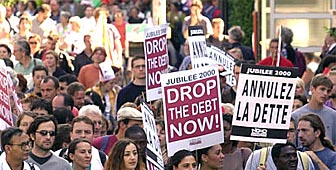NGOs call for fair trade liberalisation

A broad coalition of Swiss non-governmental organisations says it has been left out in the cold by the economics ministry in formulating trade liberalisation policy.
In a statement released on Thursday, the “Swiss Coordination for Fair World Trade” said Switzerland had to fundamentally revise its position concerning ongoing negotiations to liberalise agriculture and primarily the services sector.
By March 2001, the Geneva-based World Trade Organisation hopes to launch formal negotiations on agriculture and services. No progress was made on these controversial issues at last year’s summit in Seattle. Member states have been given until the end of this year to put forward their proposals.
The 40 NGOs – representing farmer groups, trade unions, consumer associations, and development and environmental organisations – called for direct talks with officials in the State Secretariat for Economic Affairs.
The head of the coalition, Peter Niggli, told swissinfo that “up to now Swiss interests have been defined in discussions between the administration and Switzerland’s business associations. But naturally, business doesn’t include everyone in the country. Our coalition doesn’t think that the Swiss position, or let’s say the western position, is generally in the interest of the population at large.”
Niggli reserved most of the criticism for Switzerland’s stance on liberalising the services sector. “Up to now every state has been able to voluntary participate, to say ‘okay, we’ll open this sector, we’ll close that sector’. So the services agreement is very different than the rest of the WTO accords. Now, western governments want to have a binding agreement on services.”
He argued that even though opening markets for services would mean more efficiency through privatisation, “it would exclude certain sections of the population from services such as health care and education if people can’t pay, so we don’t think that is the solution”.
Concerning agriculture, Niggli said the Swiss government had gone a long way to meeting most of the coalition’s demands.
Switzerland made its position clear at an international conference in Norway earlier this month, which was attended by both industrialised and developing countries. In a paper, the Swiss delegation said agriculture was not only essential for food security but also played a key role in ensuring the viability of rural areas, as well as biological and cultural diversity.
The final declaration of the conference recognised that “these objectives cannot be achieved by market forces alone”.
Niggli warned the economics ministry the time had come to negotiate with the coalition. He reminded the ministry that Switzerland’s final position would have to be approved by parliament, and, if necessary, the NGOs wouldn’t hesitate to call a nationwide vote.
by Dale Bechtel

In compliance with the JTI standards
More: SWI swissinfo.ch certified by the Journalism Trust Initiative









You can find an overview of ongoing debates with our journalists here . Please join us!
If you want to start a conversation about a topic raised in this article or want to report factual errors, email us at english@swissinfo.ch.